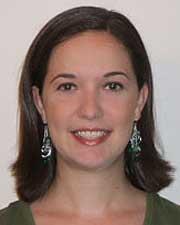Paula Fite

- Professor of Psychology & Applied Behavioral Science
Contact Info
Lawrence
Biography —
Dr. Fite received her Ph.D. in Clinical Psychology from the State University of New York (SUNY) at Buffalo in 2007. Following an APA-approved Clinical Residency at the University of Mississippi Medical Center, she joined the faculty of the University of Tennessee. She joined the faculty of the University of Kansas in 2011, and is currently an Associate Professor of Psychology and Applied Behavioral Science. Dr. Fite is the author or co-author of more than 100 empirical papers and chapters in her area of study. She is on the editorial board of Child Psychiatry and Human Development, the Journal of Psychopathology and Behavioral Assessment, and Substance Abuse: Research and Treatment. Fite served as a Member-at-Large for Early Career Psychologists for the Society for Child and Family Policy and Practice (Division 37 of APA) from 2014 through 2016. She was awarded the American Psychological Foundation’s Diane J. Willis Early Career Award in 2014, the Steeples Award for Service to Kansas in 2015, the Barbara Schowen Undergraduate Research Mentor Award in 2015, and the Byron A. Alexander Graduate Mentor Award in 2016. She is also an American Psychological Association Fellow (since 2015). In 2017 she was selected as a Docking Faculty Scholar.
Education —
Research —
The lab's programmatic line of research focuses on developmental models of risk for child and adolescent problem behavior. That is, we are interested in the etiology and developmental progression of child and adolescent problem behavior - aggression, delinquency and substance use in particular. Consistent with social learning theory, which posits that behavior is learned and further exacerbated through socialization processes (i.e., modeling, conditioning, and reinforcement), our research has and will continue to examine the unique and interactive impact of environmental context (e.g., neighborhood, parents, and peers) and child characteristics (e.g., genetics, temperament) on the developmental progression of child and adolescent problem behavior.
Research Interests
- Aggression
- Delinquency
- Substance use
Teaching —
Dr. Fite teaches courses and mentors students in the Clinical Child Psychology Program at the University of Kansas. Potential students interested in the development of aggression, peer victimization, delinquency, substance use and other problem behaviors are encouraged to apply.
Teaching Interests
- Antisocial youth
- Developmental psychology
- Intellectual assessment and academic achievement
Selected Publications —
Evans, S. C. & Fite, P. J. (in press). Dual Pathways from Reactive Aggression to Depressive Symptoms in Children: Further Examination of the Failure Model. Journal of Abnormal Child Psychology.
Evans, S. C., Frazer, A. L., Blossom, J. B., & Fite, P. J. (in press). Forms and functions of aggression in early childhood. Journal of Clinical Child and Adolescent Psychology
Fite, P. J., Brown, S., Hossain, W., Manzardo, A., Butler, M. G., Bortolato, M. (in press). Tobacco and cannabis use in college students are predicted by sex-dimorphic interactions between MAOA genotype and child abuse. CNS Neuroscience & Therapeutics
Fite, P., Cooley, J., Poquiz, J., & Williford, A. (in press). Pilot Evaluation of a Targeted Intervention for Peer Victimized Youth. Journal of Clinical Psychology.
Cooley, J. L., Fite, P. J., & Pederson, C. (2018). Bidirectional associations between peer victimization and functions of aggression in middle childhood: Further evaluation across informants and academic years. Journal of Abnormal Child Psychology, 46, 99-111.
Fite, P. J., Cushing, C. C., Poquiz, J., & Frazer, A. (2018). Family Influences on the Use of E-Cigarettes. Journal of Substance Use, 23, 396-401.
Fite, P. J., Pederson, C. A., & DiPierro, M. (2018). Individual Risk Factors Associated with Increased Levels of Restricted Housing among Detained Youth. Residential Treatment for Children and Youth, 35, 139-154.